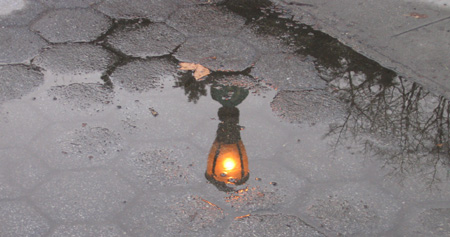Three-Pronged Question
It is, at last, very cold — very. I have brought inside the bottles of wine that chilled for the party on the balcony; later today, I’ll bring in the beer, the soda (a few eight-ounce cans of Coke and Diet Coke — nobody drinks soda at our parties — and the bottled water, although where I shall put the bottled water is anything but clear. The beer and the wine will go back outside as soon as the air stops being frigid. It will take me a while to go through them, but go through them I shall, and long before the weather turns warm.
The party on Sunday was a success. I’ve become binary about this sort of thing: a party is either a success or it isn’t, and modifiers, such as “big success,” make no sense anymore. It comes down to this calculus: was the party worth the trouble? This, in turn, depends on a three-pronged question. The first part is relatively simple: did the guests seem to have a good time? (I can’t, of course, ask if they really did.) The answer to that would have to be “yes.” Almost everyone who showed up found someone to talk to with an animation suitable to “the holiday spirit.” The few exceptions appeared to enjoy themselves while they were here.
The second part is: did Kathleen have a good time? This is the question that I can ask directly, knowing that Kathleen’s answer will be honesty itself. For a long time, I was disinclined to give parties for the simple reason that Kathleen complained that she never got to talk to anyone at any length. In those days, our parties were rather more raucous, evening affairs. Now that my model is the vicarage tea, however, Kathleen (and the other guests as well) can do some serious catching up. That, in the end, is what the party is for. Only a few of our regular guests see one another outside of our living room, but they have been seeing one another in it for so many years — the living room itself has not been changed (however mildly redecorated) in nearly a quarter-century — that an agreeable amount of mutual interest has accrued. I am rather relieved to report that none of our friends has so far undergone the kind of transformation that makes the Princesse de Guermantes’s party, at the very end of Proust, so positively exciting and even bouleversant, but we have certainly reached the point where just showing up in one piece is interesting. Illness and disease have, so far, not begun to take their inevitable toll.
Kathleen enjoys herself because the guests don’t have to be made to feel at home. They already feel at home (or so they tell me) the minute they walk in the door and see once again all the familiar clutter. By the time they’ve deposited their coats on the bed, they’re ready to party — even if it’s in a decidedly vicarage-tea sort of way.*
Finally: did I have a good time? And I daresay you can tell from what I’ve already written that I most certainly did. So it was all worth the trouble — which wasn’t very great: by the next morning everything had been quite easily tidied up and put away.
Except, that is, for the drinkables out on the balcony. A few minutes ago, I was interrupted by a loud, sharp report, as one of the small cans of Diet Coke literally blew its top. Clean off! Now everything but the bottled water is in the kitchen, where further explosions, if any, will do the least damage.Â
* Please bear in mind that “vicarage tea” is an ideal that no crowd of durable Manhattanites can ever attairn. The dim hush is quite beyond us.

